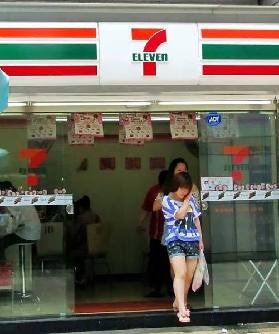
Seven-Eleven Beijing Co Ltd, the local offshoot of retail giant 7-Eleven Inc - which claims to be the world's largest convenience store chain with 46,000 stores in 16 countries - is planning a major expansion program in regional capitals across China.
Liu Yue, its vice-president, told China Daily the company is opening new stores in Qingdao, Shandong province, in November, and also eying more locations in provincial capitals including Wuhan, Chongqing and Changsha.
 |
|
A Seven-Eleven store is seen in the photo taken on July 25, 2011 in Shanghai. [Photo/Asianewsphoto] |
"We want to go into one or two places a year," Liu said. "The market is huge. But we are not going to go too fast. We need to prioritize and find the best partnerships."
According to analysts, rapid urbanization in China has created a big market for the convenience store culture, which is dominated by foreign players.
There are 151 Seven-Eleven stores in Beijing and 53 in Chengdu, operated by Seven-Eleven Beijing.
There are also 99 licensed Seven-Eleven convenience stores in Shanghai run by Uni-President Group, and 549 such stores in Guangdong province in South China managed by Dairy Farm of Hong Kong, the pan-Asian retail group.
Japanese companies also play a major role in the convenience market in Asia.
Japan's Lawson Inc, for instance, has more than 300 stores in Shanghai, and has expanded its presence in Chongqing and Dalian.
Japan's FamilyMart Co Ltd launched its presence in Shanghai in 2004 and has vowed to increase to 8,000 stores by 2021.
Though the concept of the "corner shop" is not new in China, many in the past have been extensions of local supermarkets or family-run small businesses, said Chen Lei, a retail analyst at China Galaxy Securities.
He added there are huge opportunities in the country for convenience stores as supermarkets and hypermarkets have slowed their growth in major cities.
"People with a rising income nowadays want variety and convenience, more than affordability," Chen said.
Foreign-style convenience stores are increasingly being opened adjacent to central business districts, offering a clean look and layout, and ready meals - which, in the case of Seven-Eleven, come with a operational manual so they taste no difference in any store and are one of its most profitable items.
According to Liu Yue, almost 90 percent of the materials going into Seven-Eleven's meals are ready to eat before being delivered to the stores, with assistants only needing to warm them up - a massive attraction of the Seven-Eleven business model.
Despite the weakness of a short shelf life, the stores also offer customers the opportunity to buy other products to go with their meals, such as cold drinks and snacks, which generate much higher profit margins, he said.
In addition, services such as helping consumers pay for their water and electricity bills are adding to the stores' appeal.
Chen, however, said that some convenience stores are struggling to improve often razor-thin profit margins.
"They are very vulnerable to high rental costs, logistics and labor costs. Many newborn businesses are killed in their infancy," he said.
He said he was pessimistic about their appeal in smaller cities where residents are more price-sensitive.
Their logistic coverage and location density, too, must reach a certain level to allow profitable operation, Chen said.
While many convenience stores allow licensing and franchising, Chen said it takes a long time and a large investment to make profits.
wangzhuoqiong@chinadaily.com.cn